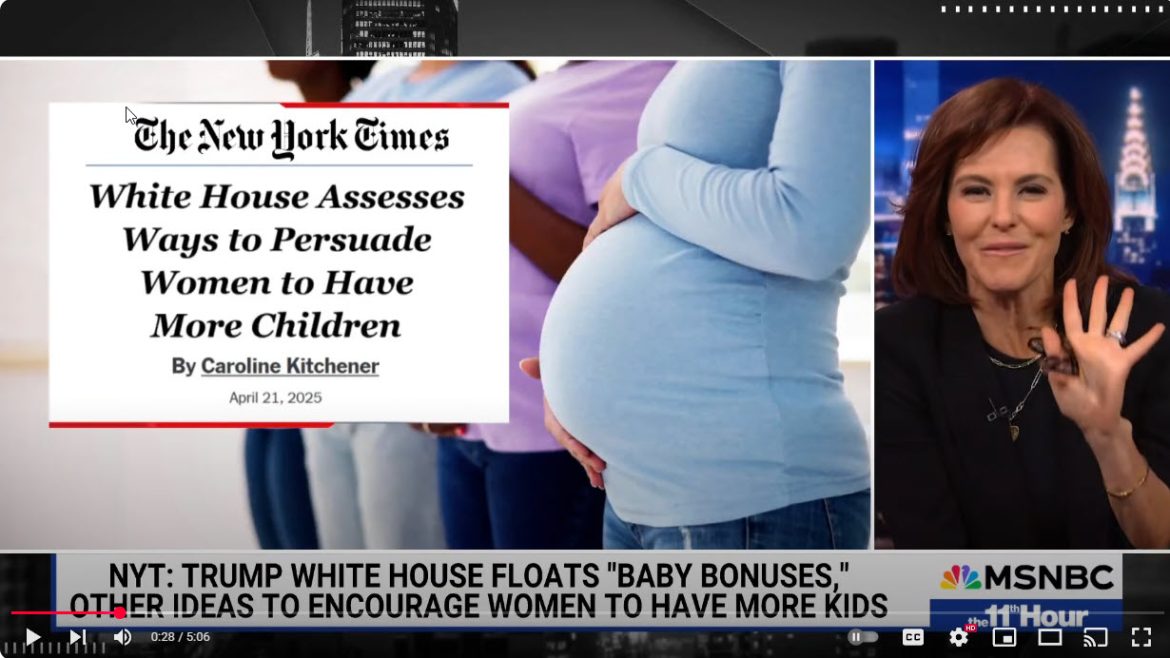President Donald Trump signals his support for a proposal that would provide financial bonuses to mothers after childbirth, calling the concept a “good idea” as his administration explores policy tools to counter declining birth rates across the United States. The idea is part of a broader set of initiatives under consideration by the White House, which also includes increased education funding for women’s reproductive health and menstrual awareness.
When asked by reporters about the reported proposal during a press event, Trump responded positively. “It sounds like a good idea,” he said. “We want strong families, and we want to support the women who build them. The birth rate is something we’ve got to take seriously.”
According to sources close to the administration, the “mom bonus” proposal would provide a direct financial incentive to women upon giving birth, potentially in the form of a one-time payment or an annual tax credit tied to childbirth. The initiative is still in the early stages of policy development, but insiders say the goal is to encourage higher birth rates amid growing demographic concerns.
The U.S. birth rate has steadily declined over the past several decades, reaching near-historic lows in recent years. The Centers for Disease Control and Prevention (CDC) reported that in 2023, the U.S. fertility rate dropped to 1.64 births per woman—well below the replacement rate of 2.1 needed to maintain a stable population without immigration. Experts warn that if the trend continues, it could lead to a shrinking workforce, weakened economic growth, and increased pressure on social security and healthcare systems.
While many countries, particularly in Europe and East Asia, have implemented pro-natalist policies like child allowances, subsidized daycare, and extended parental leave, the U.S. has historically offered limited direct support to parents, especially on a federal level.
The proposed mom bonus, if implemented, would represent one of the most overt financial incentives for childbirth ever introduced by a U.S. administration. Conservative lawmakers and family-focused organizations have applauded the idea, arguing it affirms traditional family values and offers practical support to mothers.
Critics, however, have raised concerns about the lack of detail and potential inequities in implementation. Some women’s rights groups caution that without broader support measures—such as affordable childcare, maternal healthcare access, and workplace protections—financial bonuses alone may not significantly impact birth rates or improve maternal outcomes.
In addition to the bonus proposal, the administration is reportedly exploring increased federal funding for education initiatives on menstrual cycles and reproductive health for young women. Advocates say improving access to knowledge and resources in these areas can empower women to make informed health decisions, ultimately contributing to healthier pregnancies and family planning.
The White House has not announced a formal legislative package yet, but sources say policy discussions are ongoing and could be introduced during the upcoming congressional session. Some lawmakers have signaled interest in developing a bipartisan coalition to support family expansion incentives.
Trump’s endorsement of the mom bonus idea underscores his administration’s focus on long-term demographic stability and its appeal to socially conservative voters. With the 2024 election cycle now behind him and preparations for a second term underway, the proposal may serve as a cornerstone of the administration’s pro-family agenda.



